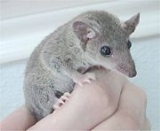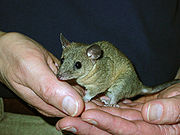
Gray Short-tailed Opossum
Encyclopedia
The gray short-tailed opossum (Monodelphis domestica) is a small member of the Didelphidae family
of opossums. It was the first marsupial
to have its genome sequenced. It is naturally found in arboreal habitats in Bolivia
, Brazil
and Paraguay
. The opossum is used as a research model
in science, and is also frequently found in the exotic pet
trade. It is also known as the Brazilian opossum, rainforest opossum and in a research setting the laboratory opossum.
 The gray short-tailed opossum possesses several features that make in ideal research model
The gray short-tailed opossum possesses several features that make in ideal research model
, particularly in studies of marsupial
s, as well as the immunological
and developmental research on mammal
ian systems. It breeds relatively easily in laboratory settings, and neonates are exposed and can be readily accessed because, unlike other marsupial species, female opossums lack a pouch
: neonates simply cling to the teats. Opossums are born at a stage that is approximately equivalent to 13- to 15-day-old fetal rat
s or 40-day-old human embryo
s. Like other marsupials, the inadequacies of the neonate's immune system function make it an ideal model for both transplant
and cancer research
, as well as general investigations into immune system
development.
Its genome
was sequenced and a working draft published in May 2007:
the decoding work, directed by MIT and Harvard, reveals the opossum to have between 18,000 and 20,000 protein-coding genes
.
Family (biology)
In biological classification, family is* a taxonomic rank. Other well-known ranks are life, domain, kingdom, phylum, class, order, genus, and species, with family fitting between order and genus. As for the other well-known ranks, there is the option of an immediately lower rank, indicated by the...
of opossums. It was the first marsupial
Marsupial
Marsupials are an infraclass of mammals, characterized by giving birth to relatively undeveloped young. Close to 70% of the 334 extant species occur in Australia, New Guinea, and nearby islands, with the remaining 100 found in the Americas, primarily in South America, but with thirteen in Central...
to have its genome sequenced. It is naturally found in arboreal habitats in Bolivia
Bolivia
Bolivia officially known as Plurinational State of Bolivia , is a landlocked country in central South America. It is the poorest country in South America...
, Brazil
Brazil
Brazil , officially the Federative Republic of Brazil , is the largest country in South America. It is the world's fifth largest country, both by geographical area and by population with over 192 million people...
and Paraguay
Paraguay
Paraguay , officially the Republic of Paraguay , is a landlocked country in South America. It is bordered by Argentina to the south and southwest, Brazil to the east and northeast, and Bolivia to the northwest. Paraguay lies on both banks of the Paraguay River, which runs through the center of the...
. The opossum is used as a research model
Model organism
A model organism is a non-human species that is extensively studied to understand particular biological phenomena, with the expectation that discoveries made in the organism model will provide insight into the workings of other organisms. Model organisms are in vivo models and are widely used to...
in science, and is also frequently found in the exotic pet
Exotic pet
An exotic pet is a rare or unusual animal pet, or an animal kept as a pet which is not commonly thought of as a pet.The definition is an evolving one; some rodents, reptiles, and amphibians have become firmly enough established in the world of animal fancy to no longer be considered exotic...
trade. It is also known as the Brazilian opossum, rainforest opossum and in a research setting the laboratory opossum.
Laboratory opossum

Model organism
A model organism is a non-human species that is extensively studied to understand particular biological phenomena, with the expectation that discoveries made in the organism model will provide insight into the workings of other organisms. Model organisms are in vivo models and are widely used to...
, particularly in studies of marsupial
Marsupial
Marsupials are an infraclass of mammals, characterized by giving birth to relatively undeveloped young. Close to 70% of the 334 extant species occur in Australia, New Guinea, and nearby islands, with the remaining 100 found in the Americas, primarily in South America, but with thirteen in Central...
s, as well as the immunological
Immunology
Immunology is a broad branch of biomedical science that covers the study of all aspects of the immune system in all organisms. It deals with the physiological functioning of the immune system in states of both health and diseases; malfunctions of the immune system in immunological disorders ; the...
and developmental research on mammal
Mammal
Mammals are members of a class of air-breathing vertebrate animals characterised by the possession of endothermy, hair, three middle ear bones, and mammary glands functional in mothers with young...
ian systems. It breeds relatively easily in laboratory settings, and neonates are exposed and can be readily accessed because, unlike other marsupial species, female opossums lack a pouch
Pouch (marsupial)
The pouch is a distinguishing feature of female marsupials ; the name marsupial is derived from the Latin marsupium, meaning "pouch". Marsupials give birth to a live but relatively undeveloped fetus called a joey. When the joey is born it crawls from inside the mother to the pouch...
: neonates simply cling to the teats. Opossums are born at a stage that is approximately equivalent to 13- to 15-day-old fetal rat
Rat
Rats are various medium-sized, long-tailed rodents of the superfamily Muroidea. "True rats" are members of the genus Rattus, the most important of which to humans are the black rat, Rattus rattus, and the brown rat, Rattus norvegicus...
s or 40-day-old human embryo
Embryo
An embryo is a multicellular diploid eukaryote in its earliest stage of development, from the time of first cell division until birth, hatching, or germination...
s. Like other marsupials, the inadequacies of the neonate's immune system function make it an ideal model for both transplant
Organ transplant
Organ transplantation is the moving of an organ from one body to another or from a donor site on the patient's own body, for the purpose of replacing the recipient's damaged or absent organ. The emerging field of regenerative medicine is allowing scientists and engineers to create organs to be...
and cancer research
Oncology
Oncology is a branch of medicine that deals with cancer...
, as well as general investigations into immune system
Immune system
An immune system is a system of biological structures and processes within an organism that protects against disease by identifying and killing pathogens and tumor cells. It detects a wide variety of agents, from viruses to parasitic worms, and needs to distinguish them from the organism's own...
development.
Its genome
Genome
In modern molecular biology and genetics, the genome is the entirety of an organism's hereditary information. It is encoded either in DNA or, for many types of virus, in RNA. The genome includes both the genes and the non-coding sequences of the DNA/RNA....
was sequenced and a working draft published in May 2007:
the decoding work, directed by MIT and Harvard, reveals the opossum to have between 18,000 and 20,000 protein-coding genes
Protein biosynthesis
Protein biosynthesis is the process in which cells build or manufacture proteins. The term is sometimes used to refer only to protein translation but more often it refers to a multi-step process, beginning with amino acid synthesis and transcription of nuclear DNA into messenger RNA, which is then...
.
External links
- Know Your STO (Short-tailed Opossums), pet care website by Molly Kalafut

